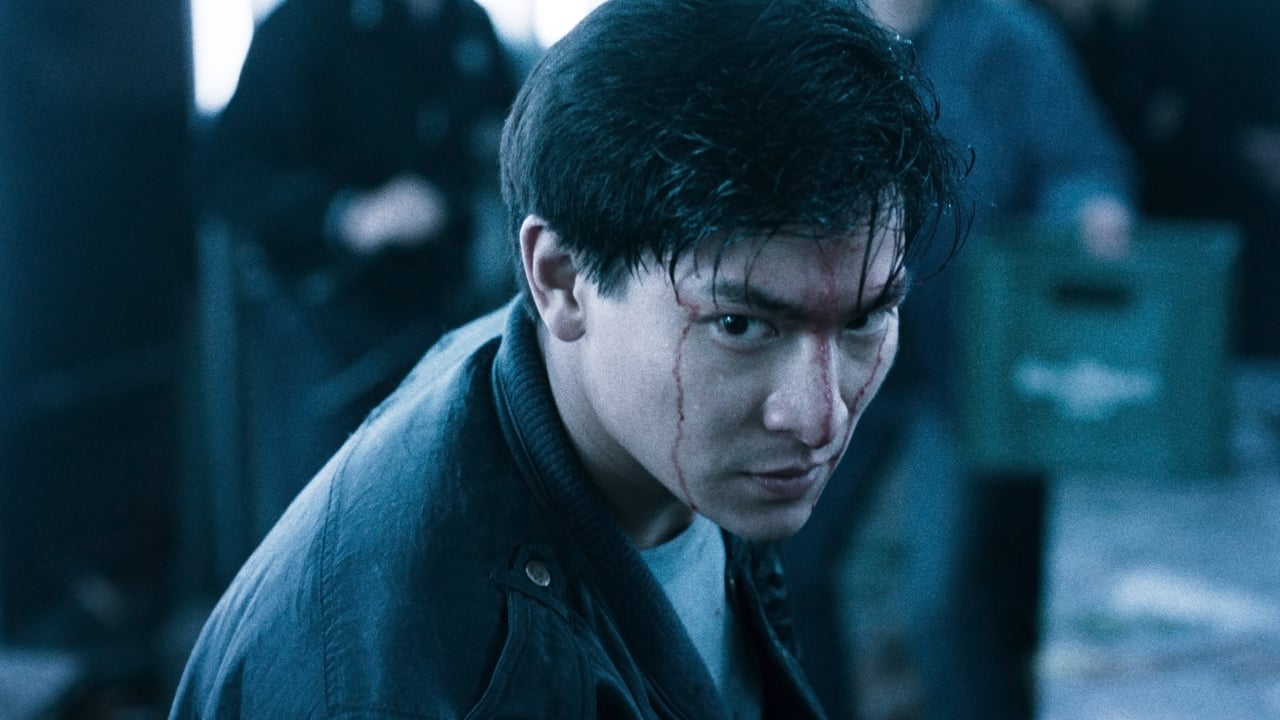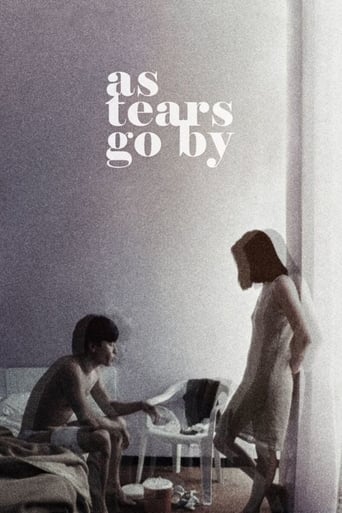BelSports
This is a coming of age storyline that you've seen in one form or another for decades. It takes a truly unique voice to make yet another one worth watching.
Clarissa Mora
The tone of this movie is interesting -- the stakes are both dramatic and high, but it's balanced with a lot of fun, tongue and cheek dialogue.
Hayleigh Joseph
This is ultimately a movie about the very bad things that can happen when we don't address our unease, when we just try to brush it off, whether that's to fit in or to preserve our self-image.
Yazmin
Close shines in drama with strong language, adult themes.
clark-carpenter
One of my favorite film viewing pastimes is going back to the early films of some of my favorite directors and getting a feel for where they've come from to get to where they are. In the last year or so, Wong Kar-Wai has firmly ensconced himself as my favorite contemporary filmmaker, and tonight, I treated myself to his 1988 debut feature As Tears Go By.What makes this film fascinating is the startling degree to which Wong's instinct for visual poetry and his ability to translate the almost physical pain of longing onto the screen are both already finely honed, though the languid pacing and narrative inventiveness of his later works (like undisputed masterpiece In the Mood for Love) are notably absent.As Tears Go By wears the clothing of a straightforward Hong Kong street opera of the type made famous during the 1980s by John Woo, though Wong also tips the cap to Martin Scorsese's Mean Streets. It features swaggering bravado and staccato violence one expects of such fare, and is both Wong's most accessible film and his only commercial success to date.As Tears Go By centers on Wah (Andy Lau), an up-and-coming Triad gangster trying to balance his own ambitions against his loyalty to his feckless "little brother" Fly (Jacky Cheung), whose impulsivity represents a constant danger, not only to himself, but to Wah as well (though he also provides an otherwise tense film with much needed humor). Wah's life is further complicated by a growing love for his cousin Ngor (frequent Wong collaborator Maggie Cheung in her first major dramatic role), a beautiful girl whose existence he was totally unaware of before she came to stay with him while seeking medical treatment in Hong Kong.Beneath the familiar aspects of genre film, however, lurk the seeds of Wong Kar-Wai's later mastery. As Tears Go By could have been just another bullet ballet, but it is instead a searing, romantic work of art, despite occasional clichés. Always something of an actor's director (and famous for leaning heavily on the improvisational talents of his stars, despite his own background as a screenwriter), he coaxes from his cast performances that are uniformly excellent. Jacky Cheung, in particular, stands out, and he imbues Fly with a reckless machismo that only serves to highlight the self-doubt that gnaws at his soul. The Hong Kong Film Awards Best Actor trophy which Cheung won for this role was well-deserved.But it is Wong Kar-Wai who really dominates As Tears Go By, as the visual and emotional style that characterized his later works is already in evidence. His signature thematic concerns of longing and memory, and the master iconography he associates with these concepts (slow burning cigarettes and torrential downpours, respectively) figure prominently in As Tears Go By, and while his mastery of the basic visual style he introduces in this film would increase with later films, he was already a powerful cinematic poet.The only elements of his mature style that are missing are the characteristically recursive and self-referential narrative structures of his later work and the constant weight of emotional isolation that so perfectly captures the disassociative rootlessness of modern existence (though the latter is not completely lacking, and is especially apparent in the opening scenes of the movie). This has the effect of slightly lessening the impact of some of the imagery, but it cannot keep As Tears Go By from being an immensely powerful debut film.8/10
Jason Forestein
What an utterly strange film this is. I cannot begin to describe how wonderful this movie made me feel. I can equate it, on a visceral level, with listening to Daft Punk's Discovery. You know, that moment in "Harder Better Faster Stronger" when you get to the real break down replete with amazing vocoderized chanting? I had this stupid grin on my face the first time I heard that and immediately stopped dancing at this club in Cork, Ireland. It was jaw dropping. So is As Tears Go By. It travels paths upon which many a film has journeyed (Mean Streets, most notably), but it contains such vibrancy and life that a rather bittersweet quasi-gangster movie is transformed into something more. It transcends the dour catholicism of Scorsese's breakthrough film and achieves a sense of joy and rapture that rivals some of the greatest, most buoyant films of all time (such as Wizard of Oz and Singin' in the Rain). The other reason to admire this film derives from its fight scenes. Compare the fisticuffs here to the work of more highly-regarded Asian action directors. Look at Crouching Tiger, Hero, or Hard Boiled and tell me that the fight scenes in those films are more brutal than the ones here. They're not. I will not go so far as to say that As Tears Go By contains better fight scenes, but I will say that I found that they hurt to watch; you could actually feel the blows. That's more than I can say for the fight scenes in those other films. The only thing that this film resembles, as far as eliciting a visceral reaction from a fight scene, is the fight in the trailer in Kill Bill 2 (or really the Uma/Vivica fight in Kill Bill 1). As Tears Goes By achieves a brutality that most directors try to avoid. And yes, that's admirable (insert rant about the desensitizing power of violence in media...).This is a great movie, but not quite as great as Happy Together or Chungking Express (it is an improvement upon In the Mood for Love). This was one of Wong Kar Wai's earliest feature films and there is an immaturity to the direction at times that almost always accompanies the work of a young director. Wong Kar Wai is one of the greatest living directors (as good a filmmaker as Herzog, Jarmusch, Spielberg, or Leigh) and should be more highly regarded. As Tears Go By is a great place to start, as it is a tad more accessible than some of his later work and offers viewers a nice portal into this filmmaker's world.
rogierr
Michael Mann meets John Woo in this pre-The Killer action movie, but WKW clearly was already on his way up to where he is now. Ripped-off music ('Slave to love' - Bryan Ferry and 'Take my breath away' - Berlin), fine and unconventional cinematography and a brotherhood theme can't make this an above mediocre action movie though. The action scenes aren't really satisfying, because the characters aren't properly build up for injustice/revenge, but the dynamic cinematography (Wai Keung Lau) heralds things to come in the career of WKW. I found it nice to watch the typical eighties-style look of this: but then I also liked L.A. Takedown (Mann, 1989) as much as Heat (Mann, 1995). I guess WKW didn't have much artistic freedom in this production, but in his forthcoming film (Days of being wild, 1991, my favourite) everything falls into place and shows his brilliance.7/10
Puppetmister
Wong Kar-Wai's feature debut is essential viewing for anyone who's been beguiled by his more recent work, but it is really just a slightly more existential take on the standard HK gangster pic. It has more commercial considerations, less emotional complexity (or navel-gazing, if you side with Jackie Chan, who called him "the most boring film-maker on the planet")* than 'Fallen Angels' or 'In the mood for love', but there's much to admire in his idiosyncratic digressions from generic conventions. Maggie Cheung, surely one of HK's finest actresses, but so rarely allowed to prove it, is slightly wasted here. Her performance is pleasingly internal and understated, far-removed from the pseudo-comic mugging she made to enact in the Police Story movies which made her famous, but her character is really just the pining girlfriend, an iconic figure of a better future. I can fully accept Cheung as the embodiment of all that is feminine and comforting in the world, but her role is a slight disappointment given the screen-melting roles Wong handed to Brigitte Lin, Faye Wong, Karen Mok and Cheung herself in later films. And, by the way, this is very violent.
* Jackie Chan also said that Amy Yip was the ugliest woman in the world and that ladies shouldn't fight in movies.

